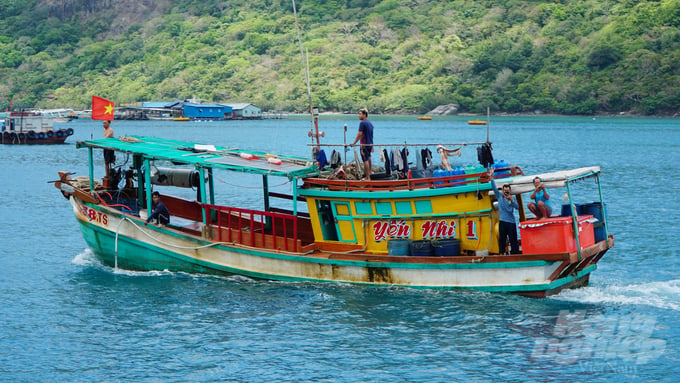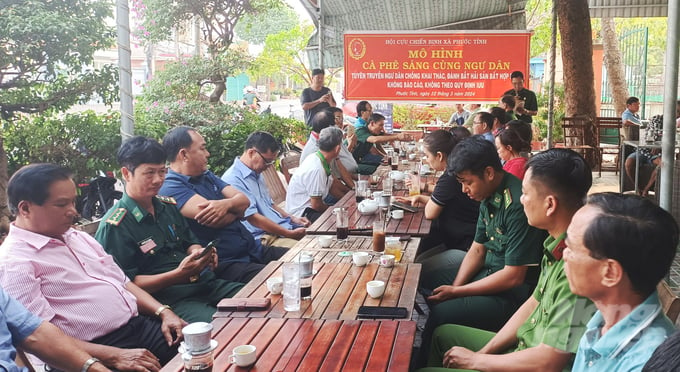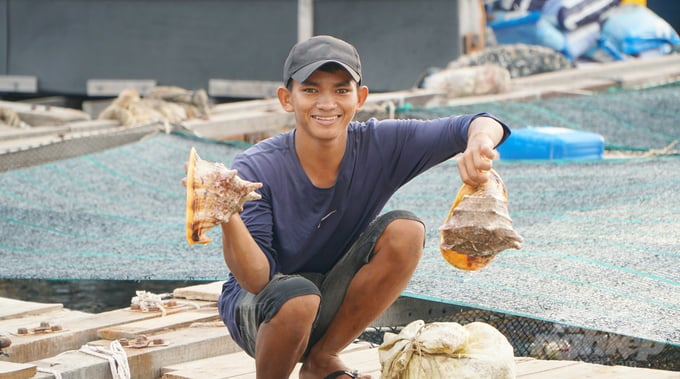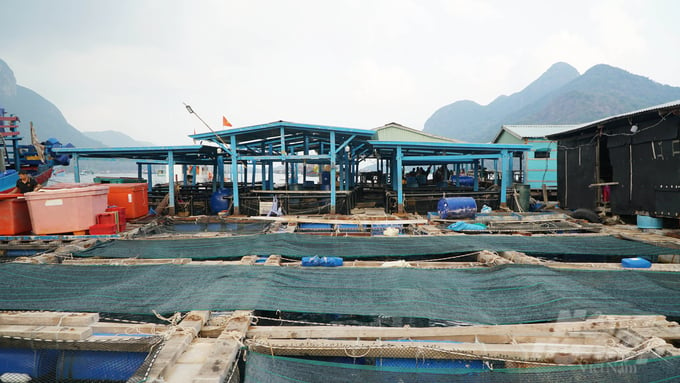May 21, 2025 | 03:35 GMT +7
May 21, 2025 | 03:35 GMT +7
Hotline: 0913.378.918
May 21, 2025 | 03:35 GMT +7
Hotline: 0913.378.918
In addition to the concerted efforts of local governments, the fishermen in Ba Ria - Vung Tau province have been contributing significantly to the implementation of the EC's recommendations in anti-IUU fishing. With responsible actions, fishermen hopes for an early removal of the IUU 'yellow card' to stabilize exports and improve livelihoods.

The EC's IUU 'yellow card' poses as a significant obstacle for Vietnam's international reputation and its fishermen community. Photo: Le Binh.
Mr. Doan Minh Duc, a fishing vessel owner from Kien Giang province, has the habit of thoroughly inspecting his vessel monitoring system before setting sail to harvest anchovy in the waters of Con Dao district. Mr. Duc acknowledges that if this equipment malfunctions, his vessel can potentially trespass in international waters while engaging in fishing activities at border areas. Beyond the immediate risks of legal repercussions such as arrest, fines, or vessel confiscation, he recognizes the broader implications for Vietnam's concerted efforts to remove the EC's IUU "yellow card".
"We operate with 24/7 network connectivity. We also never encroach upon the territorial waters of neighboring countries. We strictly adhere to the law wherever we fish, and we never trespass into foreign territories," shared Mr. Duc.
Law enforcement agencies are no longer the only facilitator for the removal of the IUU "yellow card"; the majority of fishermen have voluntarily complied with legal regulations during their operations at sea. Notably, fishermen have strictly adhered to regulations on the installation and maintenance of vessel monitoring system throughout the fishing process.
"Our vessels only operate within designated areas, which are carefully recorded in our logbook. We were also thoroughly instructed on adhering to legally designated fishing grounds, and declaring the precise longitude and latitude coordinates of our vessel to avoid trespassing into foreign waters," shared Mr. Nguyen Van Ton, a fishing vessel owner from Vung Tau city.
Ba Ria - Vung Tau province currently manages a total of 4,666 registered and licensed fishing vessels, over 3,300 of which are engaged in offshore fishing activities. The local government and fishermen have made considerable efforts towards the anti-IUU fishing initiative.

Ba Ria - Vung Tau province has effectively implemented several models and solutions to assist local fishermen in understanding and adhering to regulations on fisheries exploitation. Photo: Le Binh.
According to Mr. Phan Thach, Chairman of Phuoc Tinh Commune People's Committee in Long Dien district, nine hamlets within the commune have created nine Zalo group chats for local vehicle owners, vessel captains, and crew members in order to combat IUU fishing activities. In addition to disseminating information regarding anti-IUU fishing activities, these group chats notify disconnected vessels that leave their designated fishing grounds, allowing vessel owners to rectify in a timely manner. Alternatively, group chat members can also report these vessels to the local authorities for assistance.
"We update daily news and remind members to pay attention to the group chats. Whenever there's an announcement, fishermen can easily access the document to view its contents and benefits," Mr. Thach added.
Additionally, local governments have organized multiple information dissemination programs for anti-IUU fishing activities under various formats, enhancing local fishermen's awareness regarding compliance with fisheries regulations.
Local governments have entered a critical phase in their anti-IUU fishing campaign since the beginning of the year, with a focus on enhancing the monitoring of fishing vessel at sea, conducting thorough inspections prior to departure, and effectively tracing the origin of seafood products. By strictly adhering to these measures, the local community anticipates the prompt removal of the IUU 'yellow card,' thereby facilitating seafood exports to diverse markets.
With the determination to cooperate with local governments in removing the IUU 'yellow card,' Minister Le Minh Hoan asserts that the fisheries sector requires a more sustainable and long-term approach.
Consequently, the Minister requested Ba Ria - Vung Tau province to strengthen its efforts in reviewing EC recommendations to effectively address anti-IUU issues, with the goal of fostering a green and sustainable fisheries industry.
"We are not taking action solely because of the IUU yellow card, but rather for Vietnam's natural resources, for both the present and future generations," expressed Minister Le Minh Hoan.
At present, the global fisheries landscape is developing towards a sustainable, blue ocean approach, which denounces destructive fishing practices. Encroachment upon the territorial waters of other nations parallels an infringement of national sovereignty, which must result in serious legal repercussions. The depletion of fishing grounds stands as a primary factor driving fishermen to deliberately trespass into foreign waters for exploitation. Consequently, in fostering the sustainable growth of the fisheries sector, various nations are encouraging fishermen to adjust their practices.
Ba Ria - Vung Tau province is determined in building a sustainable fisheries industry, reducing exploitation and promoting aquaculture.

Ba Ria - Vung Tau province will develop its aquaculture industry based on three key criteria: production, product consumption, and food safety. Photo: Le Binh.
According to Mr. Nguyen Cong Vinh, Vice Chairman of the Ba Ria - Vung Tau Provincial People's Committee, the province has developed spatial planning for mariculture. Furthermore, Ba Ria - Vung Tau has focused on increasing the involvement of fishermen in cooperatives; providing instructions on cage farming to encourage active participation; and reducing the density of fishing fleets.
"Each port is supported by its own port management board, the local Sub-Department of Fisheries, fish markets, traders, businesses, and fishermen; and they should coordinate to create an ecosystem unique to each port," Mr. Vinh emphasized.
Ba Ria - Vung Tau province considers the anti-IUU fishing initiative as an opportunity to restructure its fisheries industry towards transparency, responsibility, and sustainability, while maintaining a balance between exploitation, aquaculture, and conservation, to foster a rich and diverse seafood source.
Mariculture has the potential to create an economic breakthrough, establish a stable raw material supply for seafood exports, and develop into a key focus in sustainable fisheries development strategies.
The Provincial People's Committee has also issued an Action Plan for Fisheries Development until 2030, with a vision towards 2045. The plan focuses on developing fisheries into a significant economic sector. The province aims to reach a total aquaculture output of 23,000 tons per year by 2030. Additionally, it encourages the development of recreational, artistic, and ornamental aquaculture towards integration tourism and export.
According to Ms. Pham Thi Na, Deputy Director of the Ba Ria - Vung Tau province's Department of Agriculture and Rural Development, the province aims to establish approximately 150 hectares of mariculture area by 2025 and 200 hectares by 2030. With these targets in mind, the province will develop its aquaculture industry based on three key criteria: production, product consumption, and food safety.
Namely, Ba Ria - Vung Tau will prioritize organizing production along the value chain, which encompasses seedlings and input material production, cage construction, commercial farming, processing and product consumption. Notably, businesses will play a central role in purchasing, processing, and consumption.

Con Dao possesses numerous advantages for the development of mariculture. The district aims to become a focal model for sustainable fisheries development in Ba Ria - Vung Tau province. Photo: Le Binh.
"In addition, the province is restructuring small-scale and spontaneous mariculture facilities towards community management, with a focus on group and cooperative models to enhance mutual support in production, product consumption, and environmental protection. The province will also integrate mariculture with other economic activities to utilize existing infrastructure systems and support production activities at sea," Ms. Na emphasized.
Con Dao district is currently implementing a 2-hectare mariculture pilot model within the province. With the natural advantages of sheltered bays, deep waters, and abundant food sources, the district holds significant potential for the development of mariculture, offering promising prospects for sustainable fisheries.
Ms. Phan Thi Tim, Deputy Head of the Con Dao district's Department of Economic, stated that the district is encouraging mariculture households to invest in scientific and technological approaches to ensure safety, security, and aesthetic qualities, thereby facilitating the integration with tourism development.
"Future mariculture activities must be developed in association with environmental protection and tourism to promote ecotourism at sea. This form of aquaculture can also serve as a tourist destination, where they can visit local models," Ms. Tim added.
Translated by Nguyen Hai Long

(VAN) Dong Thap farmers attained an average profit margin of 64% during the summer-autumn 2024 crop (first season), while An Giang and Kien Giang farmers followed with 56% and 54%, respectively.

(VAN) As a doctoral student doing research on renewable energy and electrification at Harvard University, the author shares his musings on electricity, nature, and countryside memories.

(VAN) The decree on Extended Producer Responsibility (EPR) ensures transparent management and disbursement of support funds, avoiding the creation of a “give-and-take” mechanism.

(VAN) Hue City rigorously enforces regulations regarding marine fishing and resource exploitation, with a particular emphasis on the monitoring of fishing vessels to prevent illegal, unreported, and unregulated (IUU) fishing.

(VAN) Hanoi People's Committee has issued a plan on reducing greenhouse gas emissions in the waste management sector with 2030 vision.

(VAN) Vietnam's draft amendment to Decree No. 156 proposes a mechanism for medicinal herb farming under forest canopies, linking economic development to population retention and the sustainable protection and development of forests.

(VAN) In reality, many craft village models combined with tourism in Son La have proven effective, bringing significant economic benefits to rural communities.